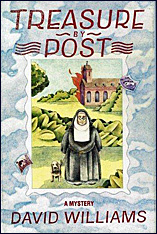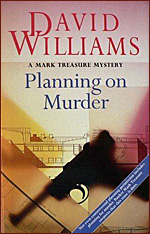Mon 24 Apr 2017
Reviewed by William F. Deeck: Two MARK TREASURE novels by DAVID WILLIAMS.
Posted by Steve under Reviews[3] Comments
William F. Deeck
DAVID WILLIAMS – Treasure By Post. Mark Treasure #15. Macmillan, UK, hardcover, 1991,. St. Martin’s, US, hardcover, 1992.

For the delectation of those with taste and perception, here is yet another fine Mark Treasure novel. [Besides solving mysteries, Treasure is a merchant banker in London, England.} In this one he is asked if he would consider being beneficiary of a Church of England convent — not a penniless convent, but one that has assets of around 11 million pounds in trust, all for the benefit of three nuns.
A recently late, if I may put it that way, beneficiary had been beaten up by yobbos and suffered a fatal heart attack. After Treasure goes to the area and begins to ask questions about the trust, another death occurs and the convent is fired by an arsonist.
As always, Williams’s characters are top-notch, particularly Sister Mary Maud, the setting superb, the humour (or wit, if you prefer) plentiful and unforced, and the trust and crimes marvellously complex.
In addition, the philatelists among mystery readers, whose hobby is often neglected in the literature, should find the stamp information fascinating, as should those who use stamps only for dispatching things in the post.
In addition, I was delighted that Treasure managed to work everything out satisfactorily in the end since, like Canon Stonning, I was in a bit of a muddle.

DAVID WILLIAMS – Planning For Murder. Mark Treasure #16. Collins Crime Club, UK, hardcover, 1992. No US edition.
On the back of the dust jacket for David Williams’s most recent Mark Treasure novel is a quotation from Mystery & Detective Monthly, a U.S. letterzine, that describes Williams as “the English Emma Lathen,†a claim that is indisputably true.
This Treasure novel is slightly less amusing than its predecessor, Treasure By Post, which is not a criticism, merely an observation. Even David Williams’ talent, which is considerable, would be hard-pressed to turn politics, planning permission, and economics into constant amusement.
However, he does make what might seem a tedious subject interesting and understandable, while providing sufficient sly and dry wit, complex crimes, the usual first-class Treasure investigation, a wonderfully insalubrious pub, and a superb comic character in Larkhole. In addition, the title turns out to have a double meaning.
Williams continues to be an author to be cherished and encouraged by both word and gesture.
April 24th, 2017 at 12:25 pm
There were in all seventeen Mark Treasure novels. Most were published in the US, but I don’t think they caught on very well over here. The humor may have been too subtle and as Bill also suggests, was uneven from book to book.
I remember reading the first one, UNHOLY WRIT, published here in 1977, and enjoying very much. I was disappointed with the second one, though, not finding it funny at all, and I never read another.
April 26th, 2017 at 9:09 pm
One of those series I read off and on, usually enjoyed, but did run into the odd dud.
August 19th, 2025 at 9:36 am
[…] liked the Treasure series and reviewed two of them on the Mystery File blog in 2017: https://mysteryfile.com/blog/?p=47625 […]